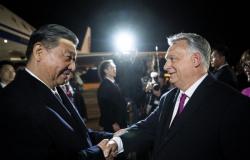Protests over the war between Israel and Hamas have reached a boiling point at US universities, with police involved in clashes with pro-Palestinian protesters who have set up camps on dozens of campuses and more than 500 arrests have been made.
Pro-Palestine protests in New YorkPhoto: Allison Bailey/NurPhoto / Shutterstock Editorial / Profimedia
The experts quoted by Sky News explain what their demands are, how things escalated and where were the people arrested? Here’s what’s happened so far.
What are the protests about?
The message from the students in the camps was simple: they want their universities to have no ties to Israel or any company that supports the war in Gaza.
This demand has its roots in the Boycott, Divestment and Sanctions movement, a decades-old campaign against Israel’s policies towards the Palestinians. But the specifics vary from one protest group to another, at different universities. These include these key requests:
- Stop doing business with the military arms manufacturers who supply weapons to Israel.
- Stop accepting research money from Israel for projects that help the country’s military efforts
- be more transparent about the money received from Israel and what it is used for
- Stop investing faculty investment funds with managers who profit from Israeli companies or contractors.
About 100 US universities have reported donations or contracts from Israel totaling $375 million over the past two decades, according to the Department of Education’s database.
Pro-Israel counter-protests also took place on several campuses, and some Jewish students said the protests veered into anti-Semitism and made them feel unsafe on campus.
Pro-Palestinian protest on the campus of the University of Southern CaliforniaPhoto: Amy Katz / Zuma Press / Profimedia Images
What sparked the protests?
Mass protests have dramatically intensified across the country after students set up a tent camp at New York’s Columbia University on Wednesday, April 17, demanding that the school distance itself from companies they say are “profiting from apartheid Israeli”.
It was a strategy that a small group of pro-Palestinian student activists had been planning for months, although one of them, Elea Sun, a graduate student at Columbia University, said much of the subsequent protests were spontaneous.
“It was a lot of work, a lot of meetings, and when we finally made it, I had no idea how it was going to go,” they said. “I don’t think anyone imagined it would take off the way it did.”
Why did the protests become radicalized?
Police attempted to evacuate the camp on April 18, arresting 108 protesters in the process. But those arrests proved to be an inspiration to other students across the country and motivated Columbia protesters to regroup.
There was some coordination in the protests across the country as Columbia students organized a phone call with around 200 others interested in starting their own actions at other universities (full on Sky News).
At Emory University in Atlanta, 28 protesters were arrested on Thursday after they refused to leave.
In a statement issued Thursday, USC said it “will not be able to hold the main ceremony that traditionally brings 65,000 students, families and friends to our campus.”

Protest at Sciences Po in Paris Photo: Stephane Lemouton / Bestimage / Profimedia
Protests are spreading across Europe
Protests that erupted on US university campuses against Israel’s war in Gaza inspired similar actions in Paris, writes Reuters.
Students blocked access to the prestigious Sciences Po university in Paris on Friday because of the war in Gaza, demanding that the institution condemn Israel’s actions.
“When we see what’s happening in the United States and now in Australia, we really hope it will spread here in France, the academic world has a role to play,” said Hicham, a 22-year-old master’s student in human rights and humanitarian studies at Sciences Po, quoted by Reuters.
Israel denies accusations of genocide
Israel vehemently denies any suggestion that it is committing genocide in the Palestinian enclave, although the International Court of Justice has said the allegation is “plausible”.
Some of the protests were considered anti-Semitic. A number of Jewish students said they did not feel safe at Columbia and other universities, although other Jewish students joined the demonstrations.
At Columbia, the university administration set a deadline of midnight on Thursday to reach an agreement with protesting students to avoid further disruption.
At a press conference, university spokesman Ben Chang said that if no agreement is reached, “we will have to consider options to restore peace on campus,” but did not specify what steps would be taken. .
Chang indicated that the university was preparing for further protests Thursday night.
“Genocide Joe”
In Syracuse, New York, President Biden was greeted by about 100 protesters with signs reading “Genocide Joe” and other slogans as he attended an official event.
The war began after gunmen led by Hamas launched an unprecedented attack in southern Israel on October 7, killing around 1,200 people – mostly civilians – and taking another 253 hostage in Gaza.
More than 34,180 people – mostly children and women – have been killed in Gaza since then, according to the Hamas-run Ministry of Health there.
Tags: ANALYZE students protesting main claims
-







